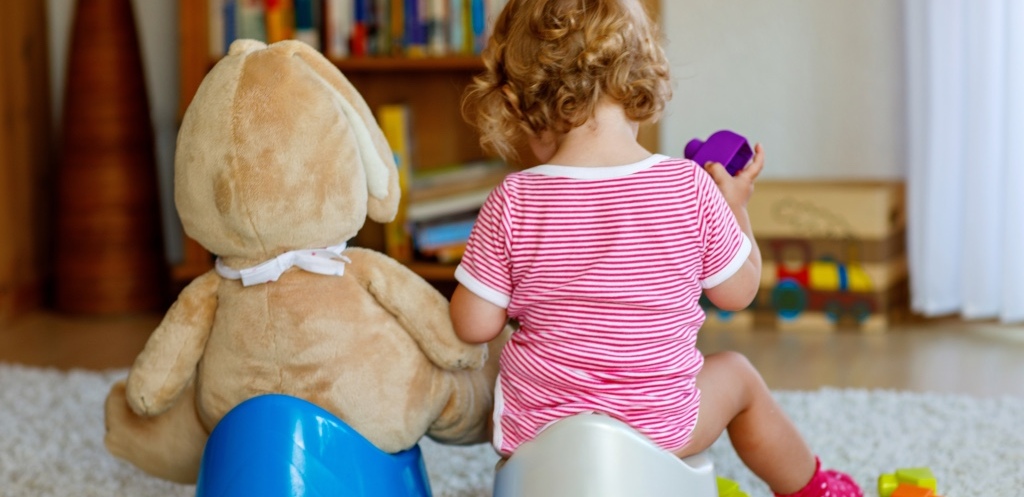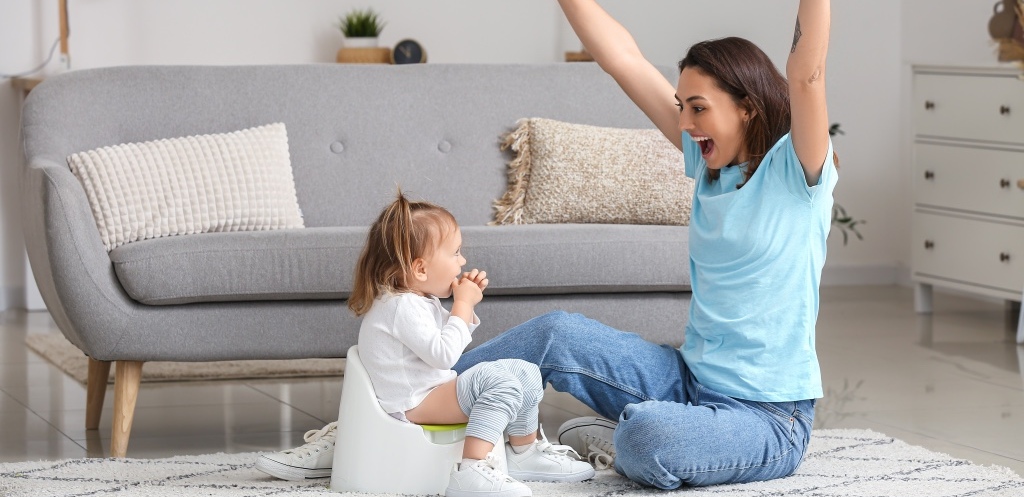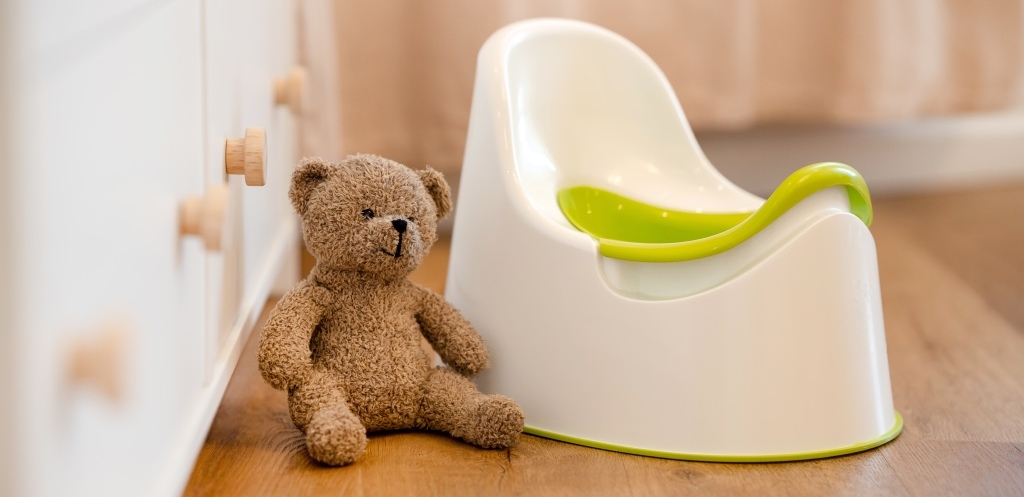Hey Mumz! The journey of teaching your little one to use the toilet, or potty training, is an exciting and significant milestone on their path to independence. It might seem like a daunting task, full of questions and advice from every direction. But don’t you worry! At Mumzworld, your trusted online baby shop in the UAE, we believe every child is unique, and successful training begins with understanding your child’s cues and a good dose of patience.
What age do you normally potty train?
The normal age for training varies greatly from one child to another. Generally, most children begin to show signs baby is ready for training between 18 months and 3 years old. The average age is around 22-30 months. The most crucial factor isn’t a specific age, but rather observing your child’s training age readiness.
When should I teach my kid to potty train?
You should teach your kid to train when they show signs baby is ready for training, rather than when they reach a certain age. These signs include being able to walk, staying dry for longer periods, showing interest in the toilet, and being able to communicate their need to pee or poop. This is the optimal time for when to start training.
Potty Training: Is Your Little One Ready? Don’t Miss These Signs!
The first and most important step in training is to know if your child is truly ready. Starting too early, before your child is developmentally prepared, can lead to frustration for both you and your little one. So, pay close attention to these key signs baby is ready for potty training:
Physical Readiness Signs:
- Stays dry for at least 2 hours during the day or wakes up dry from short naps.
- Has predictable bowel movements and is aware of them (e.g., hides when pooping, or tells you after they’ve gone).
- Can walk steadily and sit down independently.
- Can pull their pants up and down with some assistance.
Cognitive & Behavioral Readiness Signs:
- Shows interest in the toilet or in other people’s diapers.
- Imitates adults or older siblings using the bathroom.
- Can understand and follow simple instructions.
- Can communicate their need to go to the bathroom verbally or through gestures.
- Shows a desire for independence and may express discomfort with dirty diapers.
Age Readiness:
As mentioned, training age readiness varies widely, but most children show these signs between 18 months and 3 years. Remember, don’t compare your child to others; every child develops at their own pace. Focusing on toddler potty training readiness is key.
Potty Training: Effective Methods for a Smooth & Fun Journey
Once you’re confident your child is ready, you can choose a training method that suits both of you. There’s no single “perfect” method; consistency and patience are the most important ingredients for success.
Easy Potty Training Methods:
- Play-Based Training: Make it fun! Incorporate games, songs, or stories about using the potty. This positive approach helps reduce any fear of potty.
- Observation & Imitation: Let your child watch you use the toilet (if comfortable), or watch training books for kids that explain the process simply and engagingly.
- Routine & Consistency: Establish specific times for sitting on the potty (e.g., first thing in the morning, before leaving the house, after meals). Consistency helps your child learn the new routine quickly.
The 3-Day Potty Training Method:
This is an intensive method that requires full commitment. It involves spending 3 consecutive days at home with your child, encouraging frequent liquid intake, and placing them on the potty very regularly, with lots of immediate praise and rewards. It definitely requires quick potty training tips and high focus from the parent.
Positive Reinforcement (Positive Training Reinforcement):
- This is the cornerstone of success for any training method. Use positive training reinforcement through verbal praise (“Good job!”), celebrating small successes, and using training charts and rewards (like stickers or charts) to make your child feel accomplished and motivated.
- The core of how to potty train a child is always about encouragement, never punishment.
Toilet Training Tips for Toddlers:
These are general principles that apply across methods, focusing on patience, clear communication, and setting up a supportive environment.
Specific Tips for Boys and Girls:
Potty Training Boys:
- Boys may take a little longer to learn bladder control.
- It’s often recommended to teach them to sit down first for both peeing and pooping, then introduce standing to pee later.
Potty Training Girls:
- Girls often learn a bit faster.
- Always teach them to wipe from front to back to maintain hygiene and prevent infections.
Potty Training: Common Challenges & Mumzworld Solutions
The training journey isn’t always a straight line. You might encounter some bumps along the way. The key is to remain patient, calm, and informed on how to handle them. This is your comprehensive training guide to navigate potential obstacles.
Training Regression:
- It’s common for a child who was successfully using the potty to suddenly start having accidents again. This is known as potty training regression and can happen due to big changes in their life (new sibling, moving homes, starting daycare).
- Dealing with training accidents: Handle regressions calmly. Avoid anger or punishment. Simply go back to basics for a few days, offering gentle reminders and praise for any success.
Night Time Potty Training:
- Night time training is a completely different challenge and usually takes much longer than daytime training, as it relies on the child’s bladder maturing during sleep.
- Reduce liquid intake an hour before bedtime, ensure your child uses the bathroom right before bed, and consider using pull-ups for training specifically for nighttime as a transitional aid.
Fear of Potty Training:
- Some children may develop a fear of potty. This could be a fear of the flush, falling in, or even fear of the sensation of pooping in the toilet.
- Address this calmly, never force them. Make the bathroom a safe and fun place. Reading potty training books for kids can help ease fears by normalizing the process.
Challenging Potty Training Behaviors:
You might encounter challenging training behaviors such as refusing to sit on the potty, holding stool, or hiding to poop. These behaviors may require extra patience, creative solutions, or even consultation with your pediatrician.
Mumzworld Products to Support Potty Training:
At Mumzworld, we’re dedicated to making your training journey easier and more successful. We offer everything you need to support your child’s independence:
Potty Training Seats:
- Choose the best potty training seat that offers comfort and stability for your child. We have various options, including standalone potties and seats that fit on your regular toilet.
Charts & Rewards:
- Utilize potty training charts and rewards to motivate your child. Our selection includes fun charts, stickers, and small rewards to celebrate every success.
Training Underwear/Pull-Ups:
- Pull-ups for potty training are a good option for the transitional phase. They are easy for toddlers to pull up and down, offering a sense of independence with protection from accidental leaks.
Potty Training Books for Kids:
- Engaging training books for kids use simple stories and characters to explain the process in a fun, relatable way, helping to ease anxiety.
Bathroom Helpers:
- A step stool is essential for toddlers to reach the toilet and sink independently. Look for child-sized toothbrushes and toothpaste to encourage a complete hygiene routine.
Frequently Asked Questions About Potty Training
1. What age do you normally potty train?
The normal age for potty training varies, but most children begin to show readiness signs between 18 months and 3 years old. The most crucial factor is observing their toddler training readiness (physical and behavioral cues) rather than a specific age.
2. What is the 3-day potty training rule?
The 3-day training rule is an intensive method that involves spending 3 consecutive days at home with your child, without diapers, and consistently putting them on the potty. It requires high parental engagement, frequent liquid intake for the child, and immediate positive reinforcement for successes. It’s a method for quick potty training tips.
3. What is the 10-10-10 rule for potty training?
- The 10-10-10 rule is a strategy to build a routine and reinforce awareness during training. It involves putting your child on the potty for 10 minutes:
- 10 minutes after waking up.
- 10 minutes after meals.
- 10 minutes before bedtime.
This increases opportunities for success and helps children recognize their body’s signals.
4. When should I teach my kid to potty train?
You should teach your kid to potty train when they clearly show that your baby is ready for training, such as being able to communicate needs, staying dry for longer periods, showing interest in the potty, and having the motor skills to manage their clothing. Starting based on readiness, not just age, significantly increases the chances of success and makes the process easier for everyone.
Potty Training – A Journey to Independence with Confidence from Mumzworld
Potty training is a significant and sometimes challenging milestone, but it’s also a wonderful opportunity to foster your child’s independence and confidence. Remember that patience, consistency, and endless encouragement are your best tools. Every child’s journey is unique, so celebrate the small victories and don’t get discouraged by setbacks.
At Mumzworld, we’re committed to providing you with all the essentials to make your training journey as smooth and enjoyable as possible. From the best potty training seat to charts, books, and helpful accessories, we have everything you need.
Explore our comprehensive collection of potty training essentials today at Mumzworld UAE, and confidently guide your child towards a big step in their independence!








